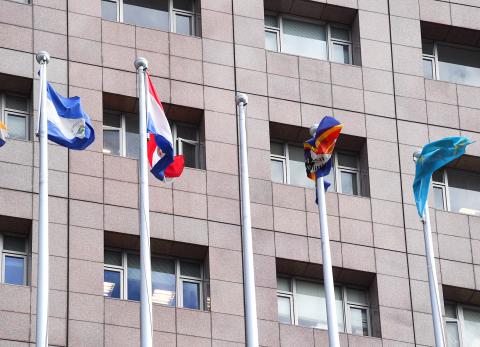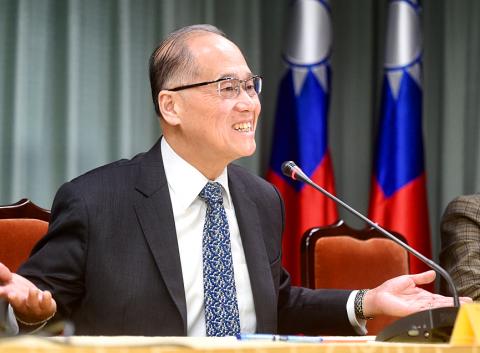The government yesterday expressed its regret over Sao Tome and Principe’s decision to cut its 19-year-old diplomatic ties with Taiwan, acknowledging that “gambling behavior” by the African nation was prompted by Taipei’s denial of its request for an exorbitant amount of financial aid.
Speaking at an impromptu news conference in Taipei, Minister of Foreign Affairs David Lee (李大維) said that to safeguard the nation’s dignity, Taiwan would immediately cut its diplomatic ties with Sao Tome and Principe, shutter its embassy and halt any cooperative programs with the African nation.
“Since the establishment of diplomatic ties in May 1997, Taipei has assisted Sao Tome and Principe in promoting national development, with our bilateral cooperation touching upon the areas of public health, medicine, agriculture, basic infrastructure, energy and education,” Lee said.

Photo: CNA
Singling out Taiwan’s antimalarial scheme in the African nation, Lee said thanks to continuous efforts by Taiwan’s malaria prevention counseling delegation, malaria incidence in Sao Tome and Principe fell from 50 percent in 2003 to 1.01 percent last year.
Despite Taipei’s determination to do its utmost to help its diplomatic allies promote national development, Lee said Sao Tome and Principe’s financial hole is simply too deep for Taiwan to deal with.
“Accordingly, it disregarded its nearly 20-year friendship with us and approached both sides of the Taiwan Strait to seek the highest bidder. We regret and deplore Sao Tome and Principe’s reckless and unfriendly decision,” Lee said.

Photo: Chien Jung-fong, Taipei Times
He added that the incident would not cease Taipei’s resolve to expand the nation’s international space and push its “steadfast diplomacy.”
Asked to confirm media reports that Sao Tome and Principe had asked the government for NT$6.4 billion (US$199.9 million), Lee declined to reveal the actual amount.
“It did ask for an astronomical number, but we refused to play the checkbook-diplomacy game,” Lee said.
“We would rather initiate programs that actually improve the welfare of the people of Sao Tome and Principe. The African nation’s need for money to fill its financial hole is neither Taiwan’s responsibility, nor is it something we are willing to do,” Lee added.
Asked whether Beijing had attempted to lure Sao Tome and Principe with money, Lee said the government did not have that information, but it was regrettable that Beijing would take advantage of the African nation’s financial position to consolidate its “one China” principle.
Lee also denied the severance of ties was due to the President Tsai Ing-wen’s (蔡英文) refusal to adhere to the so-called “1992 consensus,” which refers to a tacit understanding between the Chinese Nationalist Party (KMT) and the Chinese Communist Party that both sides of the Taiwan Strait acknowledge there is “one China,” with each side having its own interpretation of what “China” means.
“Frankly speaking, if we look at the case of the Gambia, which broke its diplomatic ties with Taiwan in November 2013 and established a formal relationship with Beijing in March this year, that all occurred when the precondition of the ‘1992 consensus’ was met,” Lee said, referring to then-president Ma Ying-jeou’s (馬英九) adherence to the “1992 consensus.”
On the possibility that a domino effect could be set off with the nation’s other diplomatic allies, particularly the Vatican, Lee said given the nation’s diplomatic situation, that pressure would be omnipresent.
Nevertheless, the Vatican, unlike secular nations, does not require financial aid, Lee said.
Meanwhile, the Mainland Affairs Council yesterday issued a strongly worded statement denouncing Beijing resorting to “checkbook diplomacy” in attempting to reinforce its “one China” policy and inducing Sao Tome and Principe to cut diplomatic ties with Taiwan.
“We hereby express our strong discontent and regret over the incident, which has hurt the feelings of Taiwanese, destabilized the Taiwan Strait and runs counter to Beijing’s oft-stated goal of pushing for the peaceful development of cross-strait relations,” the council said.
Stressing that the government has repeatedly demonstrated its goodwill since the Tsai administration took office in May, the council said it disapproved of China’s rigid mindset and its return to the “old path of confrontation,” urging Beijing to solemnly contemplate the possible consequences of its actions.

SECURITY: As China is ‘reshaping’ Hong Kong’s population, Taiwan must raise the eligibility threshold for applications from Hong Kongers, Chiu Chui-cheng said When Hong Kong and Macau citizens apply for residency in Taiwan, it would be under a new category that includes a “national security observation period,” Mainland Affairs Council (MAC) Minister Chiu Chui-cheng (邱垂正) said yesterday. President William Lai (賴清德) on March 13 announced 17 strategies to counter China’s aggression toward Taiwan, including incorporating national security considerations into the review process for residency applications from Hong Kong and Macau citizens. The situation in Hong Kong is constantly changing, Chiu said to media yesterday on the sidelines of the Taipei Technology Run hosted by the Taipei Neihu Technology Park Development Association. With

CARROT AND STICK: While unrelenting in its military threats, China attracted nearly 40,000 Taiwanese to over 400 business events last year Nearly 40,000 Taiwanese last year joined industry events in China, such as conferences and trade fairs, supported by the Chinese government, a study showed yesterday, as Beijing ramps up a charm offensive toward Taipei alongside military pressure. China has long taken a carrot-and-stick approach to Taiwan, threatening it with the prospect of military action while reaching out to those it believes are amenable to Beijing’s point of view. Taiwanese security officials are wary of what they see as Beijing’s influence campaigns to sway public opinion after Taipei and Beijing gradually resumed travel links halted by the COVID-19 pandemic, but the scale of

A US Marine Corps regiment equipped with Naval Strike Missiles (NSM) is set to participate in the upcoming Balikatan 25 exercise in the Luzon Strait, marking the system’s first-ever deployment in the Philippines. US and Philippine officials have separately confirmed that the Navy Marine Expeditionary Ship Interdiction System (NMESIS) — the mobile launch platform for the Naval Strike Missile — would take part in the joint exercise. The missiles are being deployed to “a strategic first island chain chokepoint” in the waters between Taiwan proper and the Philippines, US-based Naval News reported. “The Luzon Strait and Bashi Channel represent a critical access

Pope Francis is be laid to rest on Saturday after lying in state for three days in St Peter’s Basilica, where the faithful are expected to flock to pay their respects to history’s first Latin American pontiff. The cardinals met yesterday in the Vatican’s synod hall to chart the next steps before a conclave begins to choose Francis’ successor, as condolences poured in from around the world. According to current norms, the conclave must begin between May 5 and 10. The cardinals set the funeral for Saturday at 10am in St Peter’s Square, to be celebrated by the dean of the College